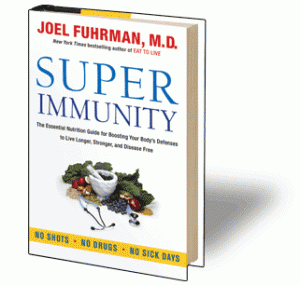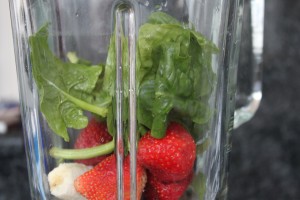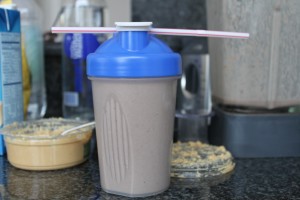 I used to be sick all the time. I was seriously that girl who got a cold that wouldn’t go away and then when it finally did, two weeks later I’d be wiped out in bed with a case of the flu or something like it. No fun. Illness is now very rare for me and when I do get a cold, it is short-lived. I credit a strong immune system and since we still have about a month left of cold and flu season, I figured I’d share a few tips from Dr. Joel Fuhrman’s book, Super Immunity.
I used to be sick all the time. I was seriously that girl who got a cold that wouldn’t go away and then when it finally did, two weeks later I’d be wiped out in bed with a case of the flu or something like it. No fun. Illness is now very rare for me and when I do get a cold, it is short-lived. I credit a strong immune system and since we still have about a month left of cold and flu season, I figured I’d share a few tips from Dr. Joel Fuhrman’s book, Super Immunity.
As the daughter of a doctor, I have always had a well-stocked medicine cabinet. At the first sign of a symptom, I’d call my dad and call out the various medications in my possession (aka free samples) and dad would tell me what to take. I’m much more resistant to taking medicine to mask symptoms these days.
And it turns out that most common cold and flu remedies are actually not very effective anyway. This was my favorite part of the book because it shed light on some of the common misconceptions about cold and flu remedies.
Cough Medications- Many of these medications may actually not improve cough symptoms and can interrupt sleep, which, as we all know, is important when you’re sick.
Antihistamines – They’re good for inducing sleep but studies show that they don’t effectively improve cold symptoms.
Ibuprofen and Aspirin- Fever is the body’s natural immune response to viral illnesses and infection so fever-reducing medications may actually prolong the illness and should be used sparingly.
Acetaminophen – More toxic than ibuprofen, acetaminophen is effective only for a short length of time and can potentially cause liver damage if over-used.
Chicken Soup – As much as we’d like to believe it helps, Dr. Fuhrman says chicken soup does not effect the common cold. In fact, animal products should be avoided when ill as they are more difficult to digest. Vegetable soup is a better choice.
Humidifier – While it’s important to keep humidity levels stable in the home, it will not speed illness recovery.
Fluid Intake – Stay hydrated but not over an above levels of thirst and basic needs as excess fluids will not “flush” the system of the virus or bacteria.
Nasal irrigation – Using a neti pot or flushing the nasal passageways with salt water can be helpful for people with chronic sinus infections but will not ease the symptoms of a cold.
Homeopathy – Herbal and nutritional remedies marketed as cold and flu fighters are not proven to prevent infection or shorten their duration.
A few others may be beneficial …
Vitamin C – Vitamin C, or ascorbic acid does not prevent the common cold in the general population but can be valuable in populations where there is inadequate consumption of fruit and vegetables. The best way to get Vitamin C to prevent illness is through a nutrient-rich diet, not supplementation.
Herbs – Some herbs like echinacea or goldenseal may have immune-enhancing properties when taken overtime and can help shorten the duration of illness but their effects have not been proven.
Garlic – It’s not validated that garlic and onion can prevent or treat the common cold but they are immune-enhancing foods and should be eaten year-round.
Resveratrol- The antioxidant found in the skin of red grapes and berries is touted for its anti-aging and anti-viral effects. Again, not yet proven, but eating the foods that contain the compound or supplementing when necessary may be helpful for disease prevention.
Have you tried any of these remedies? What was your experience?
So what really does work? Dr. Fuhrman encourages focusing on the food first and supplementing with zinc, Vitamin D and Elderberry extract:
- Eat a large salad everyday
- Eat at least 1/2 cup of beans or legumes daily
- Eat three servings of fresh fruit daily, especially berries, pomegranate seeds, cherries, plums or oranges
- Eat at least 1 ounce raw nuts or seeds each day
- Eat at least one large serving of green vegetables daily
 The book has 85 immune-enhancing recipes in back and even two weeks of daily menu planning. My boyfriend was reading the recipes over my shoulder one day (yes, he does that) and pointed out the Purple Power Smoothie he thought looked “interesting”. He doesn’t totally know it, but a version of this is now his morning smoothie which he loves.
The book has 85 immune-enhancing recipes in back and even two weeks of daily menu planning. My boyfriend was reading the recipes over my shoulder one day (yes, he does that) and pointed out the Purple Power Smoothie he thought looked “interesting”. He doesn’t totally know it, but a version of this is now his morning smoothie which he loves.
pomegranate juice
baby spinach
Boston lettuce
1/4 medium cucumber
frozen blueberries, strawberries or mixed berries
3 pitted dates
2 Tbsps ground flax seeds
ice
(measurements usually vary)
If you have adopted a healthier diet have you noticed how it has affected your immune system?




Leave a Reply